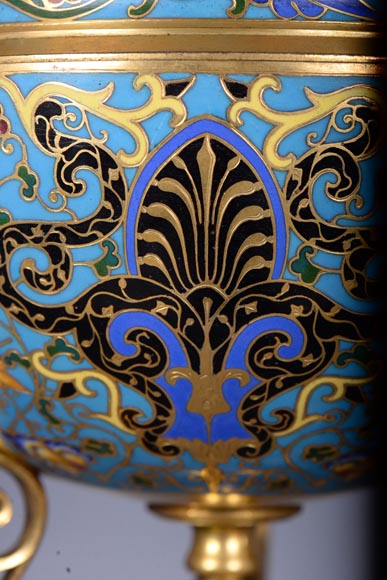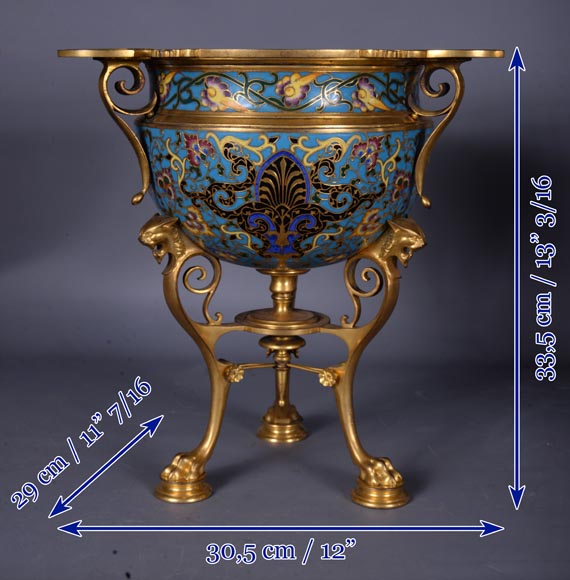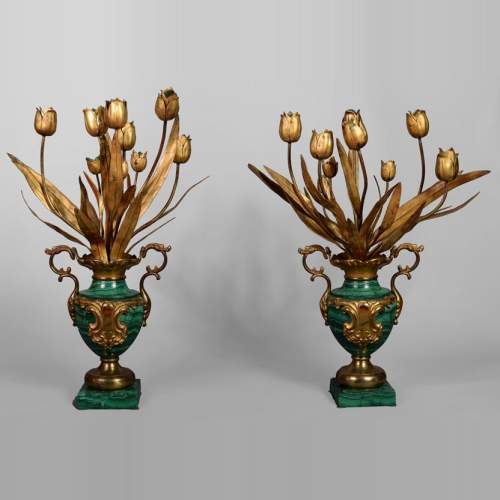Style Napoleon III / Ref.13458
Louis - Constant SEVIN & Ferdinand BARBEDIENNE - Beautiful pair of ornament vases in bronze and cloisonne enamel, circa 1862
Dimensions
Width 11'' ¾ 30cm
Height 13'' 33cm
Depth: 11'' ⅜ 29cm
Origin:
19th century.
Status:
Good condition.
This beautiful pair of vases is the result of the collaboration between Louis Constant Sevin (1821 – 1888), drawer and designer, and Ferdinand Barbedienne (1810 – 1892), bronze maker and founder of the famous 19th century foundry of the same name. Indeed, even though they are only bearing the signature of the last one, we can compare our vases to another pair presented on the Barbedienne's stand during the International Exhibition of London in 1862 depicting the same decor. We owe to the associations of the two men – which has lasted for more than thirty years, between 1855 and 1888 – an important collection of works of art and especially vases, showing the same colors and technical.
Our ornamental vases were made in bronze and show an outstanding and abundant decoration of enamel cloisonne. The gilt bronze on the blue background and the polychromatic richness of the motif reminds of an imaginary and an inspiration coming from the East. They rest on three gilt bronze feet with cat's heads, finished with claws. We notice in the shape and the decoration an eastern inspiration but above all an eclectic one, characteristic of the artistic tendency in France under the Second Empire. Indeed, Constant Sevin was inspired by patterns belonging to the Arabic, or Persian decorative repertoires for the decoration. While the handles with cat's heads tend toward reminding Egypt, the technic of divided enamel dates back to Middle Ages.
With the creation of this pair of vases Ferdinand Barbedienne and Constant Sevin participate to the reborn of champleve enamel in the middle of the 19th century. Indeed, the polychromatic decoration, omnipresent in the industrial arts during the Second Empire, finds in this technic a perfect expression. Inspired by examples of champleve enamels made during the Middle-Ages, this technic was innovated by obtaining directly during the melt the network of partitions to produce a draw of a irreproachable clarity and regularity. The first technical tries of Barbedienne were made near 1858 and four years after he presents in the Great Exhibition of London a stand mainly composed of works of art inlaid of enamels – very likely the model of our vase – which does not leave the critic indifferent. Alfred Darcel (1818 – 1893), art critic, said in his report on the Great Exhibition of 1862, published in the Gazette des Beaux-Arts : "Among the numerous works of art exhibited by Mr Barbedienne, we did not see anything more gripping than the objects decorated with enamels, kind of decoration he knew how to apply with success. […] With enamels painted that have conceded nothing to the most beautiful works of art of the 16th century first masters.[…] "
Informations
Price: on request
Recommended for you :
Dimensions:
Width: 38
Height: 61
Depth: 23
Dimensions:
Width: 25
Height: 40
Diameter: 50
Dimensions:
Width: 20
Height: 50
Depth: 20
Dimensions:
Height: 26
Diameter: 11
Dimensions:
Width: 46
Height: 19
Depth: 17
Dimensions:
Width: 38
Height: 15
Depth: 20
Dimensions:
Width: 16
Height: 22
Depth: 8
Dimensions:
Height: 29
Diameter: 12
Dimensions:
Width: 18
Height: 73
Diameter: 18
Dimensions:
Height: 32
Diameter: 15
Dimensions:
Width: 14
Height: 26
Depth: 9
Diameter: 9
Dimensions:
Width: 15
Height: 38
Depth: 15































